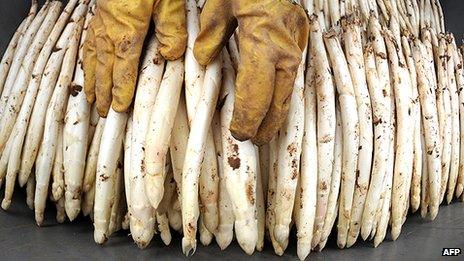Asparagus, royalty and the joys of seasonal eating
- Published

For some, having all food available at all times of the year reduces the pleasure of seasonal eating, but for others sampling what is freshest and ripest is still a cause for celebration.
It is "Spargelzeit" (asparagus season) in Germany. Just.
In my part of the world, the season opened on Thursday, with a formal tasting in the presence of dignitaries of the state of Brandenburg.
This matters. Just as the sighting - or rather hearing - of the first cuckoo in spring was once a British ritual, marked by a letter to the Times newspaper, so is the cutting of the first crowns of asparagus that peep out of the dark mounds of earth in Germany.
And now that the season is open, everybody in this country will be bombarded with the stuff for the next two months.
There will be wooden huts at thousands of road junctions selling nothing but white asparagus. Every restaurant - every restaurant - offers its own specials of asparagus wrapped in bacon, or in buttery sauce, or just plain butter with pepper, or crisp on a plate, or limp on a plate.
There is asparagus soup, asparagus sausage. I have had ham with asparagus embedded in it. Asparagus ice cream is not unknown.
And, or so I am informed by a keen-nosed friend, no toilet at a concert will now be free of the smell that asparagus imparts - it is a great leveller, she says. No matter how posh the patron of the poshest symphony hall, the smell is the same.
Not that it puts Germans off what they really do call the king of vegetables.
There will be asparagus festivals. Spargel Queens will be crowned, with crowns made of asparagus - the most imaginative have the asparagus sticking out like horns.
There will be debates about cooking - should one add sugar? And debates about peeling - is an electric peeler a betrayal of tradition? Though the usual debate about the influx of Polish labourers to pick the very prince of German vegetables has been muted this season.
Farmers have already been interviewed on television, an excuse it seemed to me for the coarser bits of the German media to get pretty female reporters to ask fat old farmers of the male variety whether asparagus really is an aphrodisiac. Please.
But most aspects of the season are very wonderful. The joy is not the food itself, but the idea of seasonality.
The food comes, you eat lots of it, you get a bit tired of it - "oh, not asparagus again," - and then it goes promptly on 24 June, the feast of John the Baptist when the industry determines that enough is enough and the stalks of the old have to be hacked ready for the next season.
This sense of everything in its time makes the food seem like a real part of the country in its raw, earthy, eternal texture - as it indeed is, a product of the dark soil itself.
Mushrooms, too, are celebrated in the same way as they come into and out of season.
Who knows what the mixture of phallic symbolism and fertile soil means in the German psyche. All I know is that to eat asparagus is to partake of the country itself.
German cooking is not as cosmopolitan as that in Britain, perhaps because Britain is a more mongrel country.
We know that chicken tikka massala is the British national dish.
Germans, incidentally, sometimes sneer at British cooking. I point out that it is actually the most varied cuisine in the world because it is so eclectic - but that cuts no ice. Or asparagus.
Spargelzeit is the most obvious sign of seasonality. But there are others which are not celebrated.
As you drink fruit juices, for example, or eat cakes - both highly advisable in Germany - you notice the ingredients changing.
The country's unsung delicacy to my palate is rhubarb, and rhubarb comes around just about now as a fruit juice and cake topping and lasts into the summer and then vanishes. And then black cherries - sweet and sour and juicy - arrive and are devoured and depart.
Britain, I am afraid, may be losing this sense of the seasons. It is surely marvellous to eat asparagus at any time of the year, flown in from Peru or Kenya. And in my family, tinned green asparagus remains a family treat at Christmas.
But there is something pretty orgasmic, too, about waiting and anticipating and then enjoying. Who can forget the first bite of an English apple in the Autumn or a new Pembrokeshire potato in the spring.
Or in Germany, a plate of white asparagus with butter and a lot of pepper, in April - in fact, this very evening.
How to listen to From Our Own Correspondent:
BBC Radio 4: A 30-minute programme on Saturdays, 11:30 BST.
Second 30-minute programme on Thursdays, 11:00 BST (some weeks only).
BBC World Service:
Hear daily 10-minute editions Monday to Friday, repeated through the day, also available to listen online .
Read more or explore the archive at the programme website .